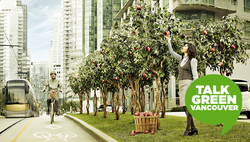The "Greenest City" Initiative

Recognizing the importance of cities taking action to conquer climate change, in February 2009 Gregor Robertson launched the Greenest City initiative[1] with the goal of becoming the greenest city in the world by 2020. In order to achieve this he created a team of highly dedicated leaders from the community who have significant and diverse experience and expertise in addressing environmental sustainability. The Greenest City Action Team(GCAT) had the audacious task of figuring out what exactly Vancouver needs to do to really become the greenest city in the world by 2020. Although there are hundreds of small things that City can and has already started, the GCAT outline ten specific long term goals that Vancouver has to accomplish:
- Green Economy: Vancouver already has a highly diversified home-grown green economy. Their long-term goal is to secure Vancouver’s international reputation as a mecca of green enterprise. Their target is to double the number of green jobs in the city by 2020 over 2010 levels. They are also developing a target to green existing jobs
- Climate Leadership: Unlike many growing cities, greenhouse gas emissions in Vancouver are on the decline, currently at the same level as they were in 1990. Their goal is to eliminate dependence on fossil fuels. Their 2020 target is to reduce community-based greenhouse gas emissions by 33% from 2007 levels.
- Green Buildings: Vancouver has the greenest new neighbourhood in North America-Southeast False Creek. Their 2020 targets are to require all buildings constructed from 2020 onward to be carbon neutral in operations and to reduce energy use and greenhouse gas emissions in existing buildings by 20% over 2007 levels.
- Green Transportation: To be the greenest city, they need to make walking, cycling and transit the preferred transportation options. Their first 2020 target is to have over 50% of trips take place by walking, cycling and public transit. Their second is to reduce motor vehicle kilometres traveled per resident by 20% from 2007 levels
- Zero Waste: They already divert 55% of regional solid waste from disposal, but ultimately they need to create zero waste. By 2020 they aim to reduce solid waste going to the landfill or incinerator by 50% from 2008 levels.
- Access to nature: Their long-term vision is that Vancouver residents enjoy incomparable access to green spaces, including the world’s most spectacular urban forest. Their first 2020 target is to ensure that every person lives within a five-minute walk of a park, beach, greenway, or other natural space. Their second target is to plant 150 000 additional trees in the city between 2010 and 2020. Currently, Vancouver has more than 200 diverse parks, and an estimated 1.6 million trees.
- Footprint: If everyone on earth lived as Vancouverites do now, we’d need four planets to sustain us. Each of the greenest city goals will contribute to an overall shrinking footprint, moving us towards a level more in line with what we have: only one planet to live on. Their target for 2020 is to reduce Vancouver’s per capita ecological footprint by 33% over 2006 levels
- Clean Water: For Vancouverites to enjoy the best drinking water of any major city by 2020 they aim to always meet the strongest of British Columbian, Canadian, and international drinking water quality standards and guidelines. They also have a target to reduce per capita water consumption by 33% over 2006 levels
- Clean Air: While Vancouver already enjoys relatively good air quality, their long-term goal is to have the cleanest air of any major city in the world. Their proposed 2020 target is to meet the most stringent of British Columbian, Canadian and international air quality standards and guidelines.
- Local Food: Vancouver has a growing appetite for farmer’s markets and community gardens. But to become a global leader in urban food systems, they’ll need to grow beyond this start. They have a 2020 target to increase city and neighbourhood food assets by a minimum of 50% over 2010 levels. That means increasing all residents’ access to food that is fresh and local, grown without harmful chemicals, and fairly produced and harvested.

In June 2010, the City launched “Talk Green to Us”, a city-wide brainstorm session about how Vancouver might achieve its targets to become the greenest city in the world by 2020. From June to October, the public were invited to submit, comment and vote for green ideas. Over 3,000 people participated in this online discussion, submitting, commenting and voting on more than 700 ideas. Over 3,700 people attended in person events and discussions, and still others were reached through our advertising campaign and direct mail.
[1] City of Vancouver, http://www.talkgreenvancouver.ca/goals
[1] City of Vancouver, http://www.talkgreenvancouver.ca/goals

